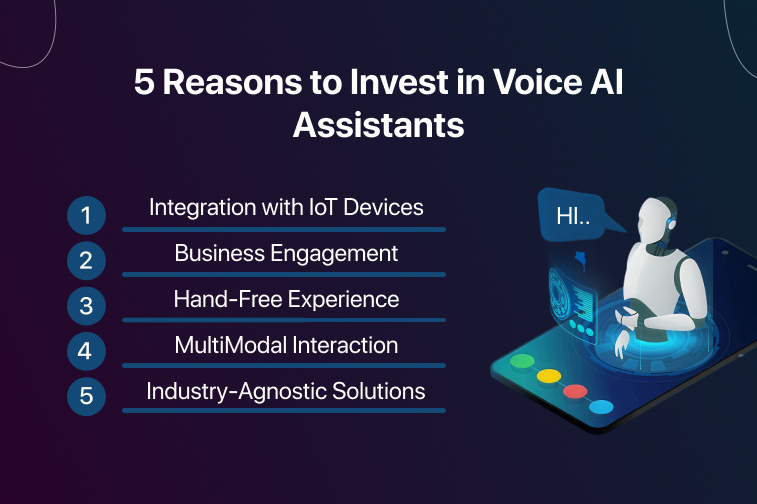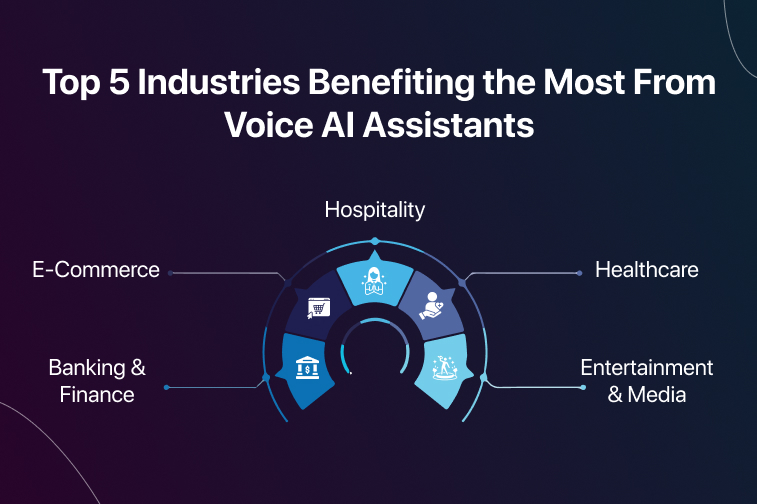No matter how remarkable your app is, it still falls short if users have to swipe, tap, and scroll through multiple tabs just to complete a simple task. This complexity kills conversions.
If you're a forward-thinking business, you're already asking: what's next?
The answer isn't fewer clicks or an app redesign. As a business owner, you want outcomes; that's why you need voice assistants in your app that let your users complete basic tasks without navigating through complex screens.
And with ongoing progress in AI, voice interfaces are becoming far more reliable and intelligent. It’s no surprise that the conversational AI software market is projected to hit USD 81.59 billion by 2032.
In this blog, we’ll explore why AI voice assistants are on the rise and how they are benefiting industries.
What is an AI Voice Assistant?
AI voice assistant is a built-in software program that responds to voice commands. These agents are powered by artificial intelligence and natural language processing(NLP).
They capture, analyse, and respond in real-time.
Standard industry practices include:
-
Automating tasks like FAQs, appointment scheduling, and order tracking
-
Integration capabilities with enterprise tools(CRMs, databases)
-
Analysing user profiles and historical data for personalized suggestions
Instead of lining up customer requests and relying on backend support, the voice AI software addresses queries by following this simple procedure:
-
The speech input software captures the user’s voice to identify search intent
-
It then fetches relevant information to generate a response
-
To further log conversations for improved customer experience
Why are Voice AI Assistants on the Rise in 2025?

Reports indicate that 82% of companies are utilizing voice technology in their daily operations, which makes conversational AI assistants a competitive necessity. Every missed customer interaction is a missed opportunity.
So let’s understand the key reasons why voice AI assistants are here to stay:
-
Integration with IoT Devices
Voice agents and IoT enable users to control devices and receive real-time assistance. This integration (referred to as IoT voice control) allows users to interact with interconnected systems.
Users can ask questions, issue commands, and receive context-aware responses.
-
Business Engagement
Businesses are adopting voice AI platforms to elevate customer experience.
From booking reservations and scheduling appointments to resolving frequent customer queries, these AI voice agents remove friction at every touchpoint.
-
Hand-Free Experience
Voice-based assistants cater to a broader audience, especially where manual interaction is inconvenient; these voice assistant applications become the core of the digital ecosystem.
Voice AI assistants go beyond mere user convenience to improve accessibility, user experience, and safety.
-
MultiModal Interaction
Voice AI apps support multimodal interactions that combine voice commands with gestures like facial expressions and non-verbal cues. These voice assistant apps are significant in handling multiple modalities for natural conversation.
In healthcare, this voice AI software uses patient speech, records, and scans for diagnostic support and preliminary assessment.
-
Industry-Agnostic Solutions
Voice AI assistants are not confined to a specific industry.
Voice technology is being adopted across industries, including hospitality, healthcare, retail, banking, logistics, and education, powering solutions like customer support, appointment scheduling, hands-free task execution, and instant data retrieval.
Use Cases of Voice AI Assistants By Industry

Whether you’re a startup trying to make an AI assistant from scratch or an enterprise aiming to scale existing AI communication apps, voice AI agents have use cases that benefit every industry.
Let’s have a look:
-
Hospitality
By leveraging voice app development, hotels can handle bookings, plan out an itinerary, resolve customer queries, and offer personalized support.
Here are the top use cases of voice apps in hospitality:
Bookings and Reservations: Order room service and book a reservation with voice commands
Itinerary Planning: Get a detailed schedule for the entire journey with real-time updates
Local Recommendations: Seek guidance on nearby tourist attractions and must-visit spots
Feedback and Follow-up: Submit reviews, and plan your upcoming expedition with ease
-
Healthcare
Voice-enabled apps in the healthcare industry play a pivotal role in patient engagement and care by automating routine hospital operations and reducing the burden on medical professionals.
According to a survey, voice-controlled personal assistants will gain more user trust in the future, resulting in widespread application in health care. And here are the key use cases of voice assistants in healthcare:
Reserving Appointments: Booking, rescheduling, and cancelling appointments with voice commands
Symptom Analysis: Preliminary assessment of patient symptoms for proactive control
Remote Patient Monitoring: The dictation software, powered by voice AI, interacts with medical professionals for real-time insights
Retrieving Records: Retrieve patient records and test results from the database with a single voice command
-
Entertainment and Media
Streaming platforms are leveraging the best AI voice software to simplify the process of content discovery and watchlist creation. These voice assistants eliminate the manual struggles and create a hands-free user interface.
The top use cases of voice assistants in the entertainment and media industries are:
Instant Media Access: Search for movies, series, and songs and get results within seconds
Watchlist Management: Create and manage personalized playlists
Suggestions: Get recommendations based on user activity
Media Control: Eliminate the hassle of play, pause, and mute with voice control
Banking and Finance
In banking and finance, voice assistants analyse user spending, suggest budgeting tips, and make financial decisions easy for users.
Check out the top use cases of these AI assistants in finance:
Check Balances: Get instant account summary and bank balance details with voice control
Financial Tips: Voice apps for personalized tips based on user spending habits
Initiating Money Transfers: Initiate instant bank transfers with voice control
Blocking Suspicious Activities: Track suspicious transactions to block accounts when necessary
-
E-commerce
Customers prefer voice assistants for quick product search. With instant add-to-cart options and tailored recommendations, voice-enabled apps are gaining popularity in the retail industry.
Let’s examine the role of voice apps in e-commerce:
Tailored Recommendations: Personalized recommendations for customers based on user history and preferences
Product Search: Instant product search and match with voice commands
Customer Care: Easy redressal of routine queries related to shipping details and order tracking
Instant Checkout: Ability to complete minor transactions with voice control
To make your own AI voice app with add-to-cart options and personalized user recommendations, you don’t need a massive development team.
The Future of Voice AI Assistants Is Now…
Voice app development is shaping the next era of digital interaction. With advancements in AI, NLP, and IoT integration, voice technology is becoming smarter, faster, and intuitive.
Whether you're in healthcare, hospitality, finance, or retail, the ability to offer hands-free user experiences is no longer optional.
To explore the capabilities of the best AI voice generator app, start by identifying how voice fits into your business goals.
At Infutrix, we specialise in building intelligent, future-ready custom voice AI for every business need. Ready to give your users the best AI voice app?
Connect with us and be a part of the voice revolution!













